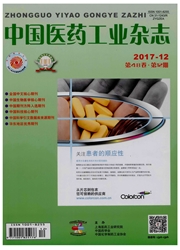

 中文摘要:
中文摘要:
在热熔挤出过程中,载体材料的玻璃化转变温度是一个非常重要的工艺参数。本试验制备了不同比例药物或添加剂与Soluplus或KollidonVA64的固态溶液,并进行差示扫描量热分析,从而考察不同物质(水分、灰黄霉素、利托那韦、胆固醇、改性大豆磷脂)对Soluplus及KollidonVA64玻璃化转变温度的影响。结果表明,上述5种物质均能降低Soluplus及KollidonVA64的玻璃化转变温度。其中,水分的存在能明显降低Solup|us及Kol|idonVA64的玻璃化转变温度,且利托那韦、胆固醇的降低作用强于灰黄霉素及改性大豆磷脂。本研究为利用热熔挤出法制备辅料为Soluplus及KollidonVA64的固体分散体提供了帮助。
 英文摘要:
英文摘要:
Hot melt extrusion (HME) is a useful technique for increasing dissolution rate of poorly watersoluble compounds. Extrusion temperature designed according to glass transition temperature (Tg) of carriers plays a most important role in the formation of desired extrudes and prevents adverse effects like drug degradation or recrystallization. The aim of this study was to evaluate the influences of different substances with different contents on Tg values of Soluplus or Kollidon VA64. Thus, the solid solutions of drugs or additives (water, griseofulvin, ritonavir, cholesterol or modified soybean phosphalipid) and carriers (Soluplus or Kollidon VA64) were prepared and the changes of Tg value were investigated by differential scanning calorimetry (DSC). It was found that the Tg value of Soluplus or Kollidon VA64 was decreased by adding all of the five substances. The Tg values of Soluplus with or without water were 63.2 and 75.6 ℃, and for Kollidon VA64 were 49.5 and 107.1 ℃. The decreasing amplitude of Tg values was larger by adding ritonavir or cholesterol, compared to the solid solution with griseofulvin or modified soybean phospholipid. This study was helpful for the wide use of Soluplus and Kollidon VA64 in HME technology.
 同期刊论文项目
同期刊论文项目
 同项目期刊论文
同项目期刊论文
 期刊信息
期刊信息
